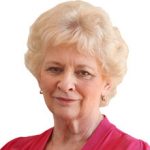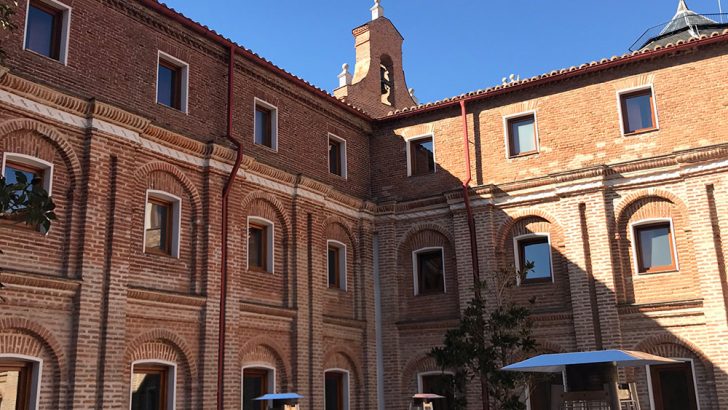The View
I had the privilege of accompanying the Catholic Bishops of England and Wales to the Royal English College in Valladolid in Spain two weeks ago. It is a beautiful and fascinating place, founded after the Penal Laws and the persecution of Catholics during the 16th-Century made the training of priests in England impossible.
In 1589, a Jesuit priest, Fr Robert Persons, asked Phillip II, King of Spain to help him to found seminaries to train priests who would work in England re-establishing the faith there.
Phillip helped him by giving him a document permitting him to appeal for funds from the civic authorities in Valladolid, and so the Royal and Pontifical English College of St Alban in Valladolid was established. It was royal because it was supported by the king of Spain.
Students were trained in Valladolid and returned to England knowing that they faced possible martyrdom. One of the college founders was Fr Henry Walpole, who left the college to return to England in 1593, and was arrested shortly after he arrived for the crime of Catholic priesthood. He refused to renounce his faith and on April 7, 1595 he was hanged, drawn and quartered, becoming the first martyr of the English College in Valladolid.
Fortune
By one of those strange quirks of fortune, I have shared my office in the House of Lords for the past nine years with seven other members, one of whom was a stalwart of the Church of England, Lord Walpole. He discovered, late in his life, that he was related to the martyr priest, Fr Henry Walpole. He told me about it one day, but, though I was surprised to hear it, I did not think much more of it. He did not mention Valladolid.
It was therefore during one of those moments when the disparate elements of one’s life seem to join up, that I realised that this Fr Henry Walpole had been one of the founders of the Royal English College of St Albans in Valladolid. In all, 23 priests who had trained in Valladolid died as martyrs, and in the beautiful chapel their relics lie under the altar.
Now the rector is officially appointed by the king of Spain and his name appears in the official Gazette of Spain! The current Rector is Canon Paul Farrer from Lancashire. He was wonderfully hospitable, constantly watching to meet all our needs, never intruding but always caring.
“It seemed to me to be the perfect place for a young man today who wants to become a priest”
Valladolid, formative home of martyrs and priests of great courage, is still a seminary. Now it provides training for what is called the propaedeutic year of priestly formation. It is a wonderful place and I met some of the current students there. Three of them were from Irish dioceses, bright, articulate, engaging young men who are seeking to discern what God wants them to do with their lives.
I wondered what propaedeutic meant. It is explained as being a programme based on the Gospel account of the Road to Emmaus where Jesus met the disciples on their journey and a profound exchange of faith took place which led them to recognise him “at the breaking of bread”.
So, I learned, the ‘course is structured around the personal journey of the seminarian and moments of encounter with the Lord’. As Canon Paul Farrer has said: “Seminarians must lay solid foundations for the future. Key to this is strong human and spiritual development. The world needs priests who are expert enough in their own humanity to genuinely ‘inhabit’ their studies and pastoral ministry.”
It was very good to meet these young men as they come to the end of their year in Spain. I have the feeling that they have been much nourished and developed in this place, and they seemed very happy. It would be a wonderful environment in which to begin studies for the priesthood, a place in which students would be free to learn, develop and discern what God wants of them in a peaceful, positive, prayerful place, for which many of those who have walked the corridors before them have a huge affection, and from which they gained much.
It seemed to me to be the perfect place for a young man today who wants to become a priest to have a year, during which they learn much about God, about themselves and about the Church in a place of beauty, history and tradition, a place which is vibrant, modern yet very old, and so very welcoming.
We were there for a period of formation and training for the English and Welsh bishops who were meeting with survivors of clerical sexual abuse so that they could learn and develop within themselves a greater understanding of the impact of child abuse and of the needs of the survivors of clerical child abuse.
It was a challenging time for everyone, especially the survivors of clerical sexual abuse who helped the bishops to understand the impact of what they had experienced; great was their generosity and courage. Among them was our own Marie Collins.
“Students were trained in Valladolid and returned to England knowing that they faced possible martyrdom”
At the end of it the bishops issued a statement. They thanked Baroness Sheila Hollins and her team for their leadership of the training, and they said publicly: “We thank especially the people who spoke to us of their experiences as victims and survivors of sexual abuse within the Catholic Church.
“We have been strengthened greatly by the prayers of so many, including seven Carmelite monasteries, we thank them too. These have been days which have touched every bishop very deeply. We have listened to the deep and lasting confusion, pain and despair, inflicted by the people who abused them. We have listened with horror to the ways in which precious gifts of our faith have been used to groom and dominate both children and vulnerable adults in crimes of abuse.
“We humbly ask forgiveness of all who carry this pain, for our slowness and defensiveness and for our neglect of both preventative and restorative actions. For us bishops, these days are a watershed. Now we accept with renewed vigor the challenges that lie ahead. We welcome warmly the Motu proprio ‘Vos estis lux mundi’ which Pope Francis has issued today, the last day of our conference, and its new provisions and requirements.”
It was a time of great privilege to be an observer of this training, having the opportunity to explain the work and requirements of the UK’s Independent Inquiry into Child Sexual Abuse, and to stay for a while in this welcoming place which seemed to me so very special. Our Church faces many challenges, here and elsewhere, but I left Valladolid with a great sense of hope, and a faith enriched by what I had seen and heard.


 Nuala O’Loan
Nuala O’Loan Pontifical English
College of St Alban in
Valladolid.
Pontifical English
College of St Alban in
Valladolid. 